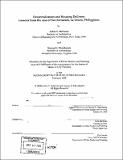| dc.contributor.advisor | Anna Hardman. | en_US |
| dc.contributor.author | Mathema, Ashna S. (Ashna Singh), 1972- | en_US |
| dc.contributor.author | Mawilmada, Nayana N. 1972- | en_US |
| dc.contributor.other | Massachusetts Institute of Technology. Dept. of Urban Studies and Planning. | en_US |
| dc.date.accessioned | 2012-01-30T16:48:56Z | |
| dc.date.available | 2012-01-30T16:48:56Z | |
| dc.date.copyright | 2000 | en_US |
| dc.date.issued | 2000 | en_US |
| dc.identifier.uri | http://hdl.handle.net/1721.1/68798 | |
| dc.description | Thesis (M.C.P.)--Massachusetts Institute of Technology, Dept. of Urban Studies and Planning, 2000. | en_US |
| dc.description | Includes bibliographical references (p. 140-147). | en_US |
| dc.description.abstract | In this thesis, we argue that national policies (of housing and decentralization) when applied indiscriminately, without regard to the political, institutional, and capacity constraints of local governments, can have negative consequences, and sometimes end up being a regressive. This is particularly true when policies, designed in response to problems of large metropolitan areas, are applied randomly across entire nations. Our study analyzes the housing sector of the city of San Fernando, in the La Union Province of the Philippines, to draw lessons about the constraints that decentralized local government units face in practice. Our findings support the arguments for the differential treatment of local governments, in the implementation decentralization and housing policies. The Philippines decentralized its governance structure in 1991, with the passage of the Local Government Code. With this law, the responsibility of implementing housing projects was devolved to the local government level. Soon thereafter, in 1992, the Urban Development and Housing Act (UDHA) was adopted with the intent of transforming the role of government in the housing sector from that of a "provider" to one of an "enabler." These reforms have been hailed as successful and revolutionary by many. Our findings challenge the alleged success of efforts to decentralize the housing sector of the Philippines. We found a conflict between some of the policies set forth in the Local Government Code and the UDHA. This conflict, combined with the limited technical and administrative capacity of local government units, such as that of San Fernando, are resulting in the implementation of housing projects reminiscent of the failed public housing schemes of the 1950s and 1960s. Through our analysis of the case, we identify the various political, social, administrative, and institutional limitations that constrain the local government of San Fernando in its approach to the housing sector. Our study suggests ways to deal with these constraints, and highlights the need for the differential treatment of local governments, in order to successfully implement decentralization, and other policy reforms in the developing world. | en_US |
| dc.description.statementofresponsibility | by Ashna S. Mathema and Nayana N. Mawilmada. | en_US |
| dc.format.extent | 147 p. | en_US |
| dc.language.iso | eng | en_US |
| dc.publisher | Massachusetts Institute of Technology | en_US |
| dc.rights | M.I.T. theses are protected by
copyright. They may be viewed from this source for any purpose, but
reproduction or distribution in any format is prohibited without written
permission. See provided URL for inquiries about permission. | en_US |
| dc.rights.uri | http://dspace.mit.edu/handle/1721.1/7582 | en_US |
| dc.subject | Urban Studies and Planning. | en_US |
| dc.title | Decentralization and housing delivery : lessons from the case of San Fernando, La Union, Philippines | en_US |
| dc.type | Thesis | en_US |
| dc.description.degree | M.C.P. | en_US |
| dc.contributor.department | Massachusetts Institute of Technology. Department of Urban Studies and Planning | |
| dc.identifier.oclc | 45383030 | en_US |
